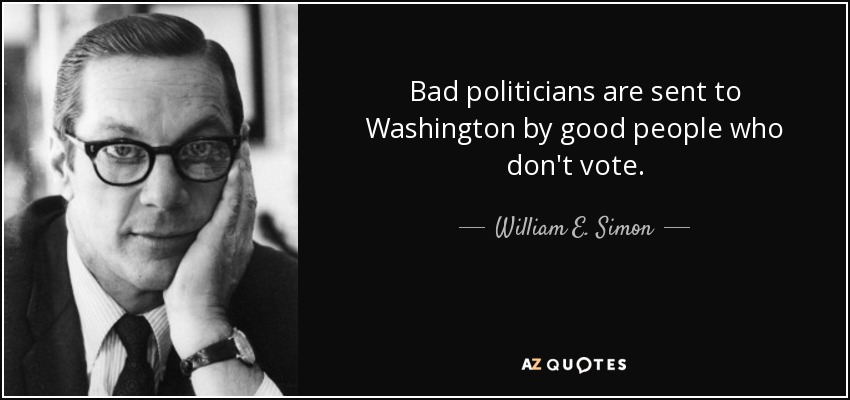People Who Dont Vote

Wealthier people tend to vote at higher rates. Harder and Krosnick (2008) contend that some of the reasons for this may be due to "differences in motivation or ability (sometimes both)" (Harder and Krosnick, 2008), or that less wealthy people have less energy, time, or resources to allot towards voting.
People who dont vote. People are usually surprised to hear I don't vote. I think many have an initial reaction of curiosity and disapproval. People who vote are often self-righteous. Why Intelligent, Caring People Don’t Vote by Nate St. Pierre on April 29, 2012 I am 34 years old, I have three kids, I am a productive member of society, and I have only voted one time, in one election, for one person – just to make sure I had experienced the entire process. 2. Reasons people don’t vote: lack of knowledge. Many people who don’t vote believe they don’t understand enough about the government, the election process or individual party policies. This is largely down to the British education system, which does not equip students with relevant political knowledge. When Democrats lose, however, it is the same stereotype – black people didn’t come out to vote. But in the last three presidential elections, black voter turnout was 59.6% in 2016, 66.6% in.
Many people who are working paycheck to paycheck may not have the luxury to take time to vote. In fact, according the Bureau of Labor Statistics, 7.8 million Americans work two jobs. These working conditions make it even less likely to for them to be able to make it to the polls. The reasons people don’t vote are just as complex. While full voter participation helps maintain a fair and functioning democracy, everything from logistics to socioeconomic status can get in the way. Here’s a list of five things stopping Americans from voting. 1. Many Americans want to vote but can’t. Black people who didn’t vote let us down, too.. When we don’t vote for president, or Congress, or state legislator, or mayor, or county prosecutor, we must deem that behavior as worthy of. In 2016, only 58% of the voting-eligible population cast a ballot in the presidential election. Young Americans, especially poor, young Americans of color, are much less likely to vote. Many other countries have higher voter turnout than the U.S., and our comparatively low election participation rate has long been a topic of discussion. Traditionally, those who don’t vote are blamed for.
People of color make up a greater share of nonvoters than active voters, and nonvoters tend to be less educated, poorer, and younger. Nonvoters tend to passively encounter news, rather than actively seek it out. People who don’t vote are less partisan and about equally split on key issues and on support for or opposition to President Donald. Despite that legacy, a substantial number of Americans don’t vote. Nearly 137 million people voted in the 2016 election — roughly 56 percent of the U.S. voting age population. Almost 100 million people who had the right to vote didn’t. The U.S. has one of the lowest voting rates of any developed nation. People have also told me they worry about feeling personally responsible if they vote for a candidate or position and there are unforeseen consequences, such as cuts to important aid programs. Grayson, first to speak, upended a truism most surprisingly. He said that an increase in the number of people who vote does not benefit either major political party.
Few people, however, vote for candidates of those “other” parties. This is because U.S. elections only reward what is known as “first past the post.” The one who gets the most votes wins. In many other countries, such as the United Kingdom, people don’t vote for individuals. They vote for parties to sit in a Parliament. The youth vote is stagnant, despite increased engagement in the political discourse. Here's why young people don't vote, and it's not because they're lazy. Why People Don’t Vote And why they should. by Kim Wehle. June 16, 2020 5:30 am. ATLANTA, GA - JUNE 09: A man recieves an "I'm a Georgia Voter" sticker after casting a ballot in Georgia's Primary Election on June 9, 2020 in Atlanta, Georgia. Voters in Georgia, West Virginia, South Carolina, North Dakota, and Nevada are holding primaries amid. Don’t let the tail wag the dog. Vote. 6. Refusing to vote is not rebellion; it is surrender. Bad people with terrible ideas essentially get elected by good people who don’t vote. Really. If you don’t vote, you surrender. The struggle for the right to vote in this country is a long and storied one—and one we should not ignore.
Waiting over an hour to vote isn’t just inconvenient for many, it’s unworkable. More than 53 million Americans earn median hourly wages of $10.22 and annual wages of $17,950. Researchers, for example, detected “passive liberals” as well—people who usually don’t vote but are generally aligned with Democrats when they do—though they further divided them into a. Do not feel bad if you secretly think your vote in the midterms doesn't matter. Contrary to the tenets of democracy, plenty of people in politics don't want you to participate—take Brian Kemp. “We found differences in voting by health and neighborhood factors that suggest that people who vote are healthier, have better access to health care and live in more cohesive and safer.
As a result, many citizens -- young people, especially -- fail to vote even though they wanted and intended to do so, the book says. “Despite eight in 10 young people saying they are interested in politics and plan to vote, less than half of them actually follow through and actually turn out. This has been true for decades.








![Carlin Why I Don't Vote [Video] carlin](https://i.pinimg.com/originals/46/62/bb/4662bb450f8efc00942ca02b0f19b534.jpg)










